| Listing 1 - 10 of 12 | << page >> |
Sort by
|
Periodical
ISSN: 13837133 15729354 Year: 1996 Publisher: Boston: Kluwer,
Abstract | Keywords | Export | Availability | Bookmark
 Loading...
Loading...Choose an application
- Reference Manager
- EndNote
- RefWorks (Direct export to RefWorks)
Constraint programming (Computer science) --- Constraints (Artificial intelligence) --- Programmation par contraintes --- Contraintes (Intelligence artificielle) --- Periodicals. --- Périodiques --- #TS:WMAG --- #TS:WDEP --- 681.3 --- Computer science --- Periodicals --- Business, Economy and Management --- Information Technology --- Life Sciences --- Mathematical Sciences --- Operations Research --- General and Others --- Micro and Molecular Biology --- Algorithms --- Applied Mathematics --- Combinatorics --- Mathematical Analysis & Logic --- Périodiques --- EJINFOR EJINGEN EPUB-ALPHA-C EPUB-PER-FT SPRINGER-E --- 681.3* / / / / / / / / / / / / / / / / / / / / / / / / / / / / --- Constraint satisfaction (Artificial intelligence) --- Artificial intelligence --- Computer programming --- Computers. --- Computers --- Constraint programming (Computer science) - Periodicals --- Constraints (Artificial intelligence) - Periodicals
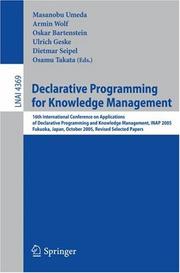
ISBN: 9783540692331 3540692339 3540692347 Year: 2006 Publisher: Berlin ; New York : Springer,
Abstract | Keywords | Export | Availability | Bookmark
 Loading...
Loading...Choose an application
- Reference Manager
- EndNote
- RefWorks (Direct export to RefWorks)
Knowledge means power – but only if it is available at the right time, the right place, and in the hands of the right people. Structured, engineered, repeatable methods to gather, transport, and apply knowledge are collectively called knowledge management. Declarative programming strives for the ideal of programming by wish: the user states what he or she wants, and the computer figures out how to achieve it. Thus, declarative programming splits into two separate parts: methods for humans on how to write wishes, and algorithms for computers that fulfill these wishes. Knowledge management is now recognized as an economic key factor. Declarative programming has matured far beyond the research stage of a merely interesting formal logic model to one of the powerful tools in computer science. Nowadays, no professional activity is thinkable without knowledge management, and companies increasingly need to document their business processes. Here, declarative programming carries the promise to be a shortcut to not only documenting but also implementing knowledge-based enterprises. This volume presents a selection of papers presented at the 16th International Conference on Applications of Declarative Programming and Knowledge Management, INAP 2005,held in October 2005 at Waseda University, Fukuoka, Japan. These papers reflect a snapshot of ongoing research and current applications in knowledge management and declarative programming. Further, they provide reality checks and many pointers for readers who consider introducing related technologies into their products or working environments. Skimming through the table of contents, technology managers as well as implementors will be surprised on the wide scope covered by this selection of papers. If you think of knowledge streams as supply, manufacturing, or distribution chains, you will see that it all ties together.
Knowledge management --- Constraint programming (Computer science) --- Declarative programming --- Gestion des connaissances --- Programmation par contraintes --- Programmation déclarative --- Congresses. --- Congrès --- Prolog (Computer program language) --- Computer Science --- Mechanical Engineering - General --- Engineering & Applied Sciences --- Mechanical Engineering --- Information Technology --- Artificial Intelligence --- Computer science. --- Computer programming. --- Programming languages (Electronic computers). --- Artificial intelligence. --- Computer Science. --- Programming Languages, Compilers, Interpreters. --- Artificial Intelligence (incl. Robotics). --- Programming Techniques. --- AI (Artificial intelligence) --- Artificial thinking --- Electronic brains --- Intellectronics --- Intelligence, Artificial --- Intelligent machines --- Machine intelligence --- Thinking, Artificial --- Bionics --- Cognitive science --- Digital computer simulation --- Electronic data processing --- Logic machines --- Machine theory --- Self-organizing systems --- Simulation methods --- Fifth generation computers --- Neural computers --- Computer languages --- Computer program languages --- Computer programming languages --- Machine language --- Languages, Artificial --- Computers --- Electronic computer programming --- Electronic digital computers --- Programming (Electronic computers) --- Coding theory --- Informatics --- Science --- Programming --- Computer programming --- Artificial Intelligence.
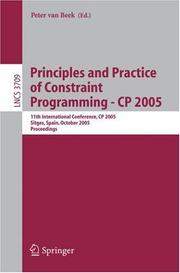
ISSN: 03029743 ISBN: 9783540292388 3540292381 3540320504 Year: 2005 Volume: 3709 Publisher: Berlin: Springer,
Abstract | Keywords | Export | Availability | Bookmark
 Loading...
Loading...Choose an application
- Reference Manager
- EndNote
- RefWorks (Direct export to RefWorks)
Constraint programming (Computer science) --- Programmation par contraintes --- Congresses. --- Congrès --- Computer Science --- Engineering & Applied Sciences --- Information Technology --- Computer Science (Hardware & Networks) --- Computer science. --- Software engineering. --- Computer programming. --- Programming languages (Electronic computers). --- Computer logic. --- Mathematical logic. --- Artificial intelligence. --- Computer Science. --- Software Engineering/Programming and Operating Systems. --- Programming Techniques. --- Programming Languages, Compilers, Interpreters. --- Artificial Intelligence (incl. Robotics). --- Logics and Meanings of Programs. --- Mathematical Logic and Formal Languages. --- AI (Artificial intelligence) --- Artificial thinking --- Electronic brains --- Intellectronics --- Intelligence, Artificial --- Intelligent machines --- Machine intelligence --- Thinking, Artificial --- Bionics --- Cognitive science --- Digital computer simulation --- Electronic data processing --- Logic machines --- Machine theory --- Self-organizing systems --- Simulation methods --- Fifth generation computers --- Neural computers --- Algebra of logic --- Logic, Universal --- Mathematical logic --- Symbolic and mathematical logic --- Symbolic logic --- Mathematics --- Algebra, Abstract --- Metamathematics --- Set theory --- Syllogism --- Computer science logic --- Logic, Symbolic and mathematical --- Computer languages --- Computer program languages --- Computer programming languages --- Machine language --- Languages, Artificial --- Computers --- Electronic computer programming --- Electronic digital computers --- Programming (Electronic computers) --- Coding theory --- Computer software engineering --- Engineering --- Informatics --- Science --- Programming --- Logic design. --- Artificial Intelligence. --- Design, Logic --- Design of logic systems --- Digital electronics --- Electronic circuit design --- Logic circuits --- Switching theory --- Constraint programming (Computer science) - Congresses
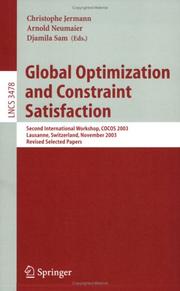
ISSN: 03029743 ISBN: 9783540260035 354026003X 3540320415 Year: 2005 Volume: 3478 Publisher: Berlin: Springer,
Abstract | Keywords | Export | Availability | Bookmark
 Loading...
Loading...Choose an application
- Reference Manager
- EndNote
- RefWorks (Direct export to RefWorks)
Theformulationofmanypracticalproblemsnaturallyinvolvesconstraintsonthe variables entering the mathematical model of a real-life situation to be analyzed. It is of great interest to ?nd the possible scenarios satisfying all constraints, and, iftherearemanyofthem,eitherto?ndthebestsolution,ortoobtainacompact, explicit representation of the whole feasible set. The 2nd Workshop on Global Constrained Optimization and Constraint S- isfaction, COCOS 2003, which took place during November 18–21, 2003 in L- sanne, Switzerland, was dedicated to theoretical, algorithmic, and application oriented advances in answering these questions. Here global optimization refers to ?nding the absolutely best feasible point, while constraint satisfaction refers to?ndingallpossiblefeasiblepoints.AsinCOCOS2002,the?rstsuchworkshop (see the proceeedings [1]), the emphasis was on complete solving techniques for problems involving continuous variables that provide all solutions with full rigor, and on applications which, however, were allowed to have relaxed standards of rigor. The participants used the opportunity to meet experts from global optimi- tion, mathematical programming, constraint programming, and applications, and to present and discuss ongoing work and new directions in the ?eld. Four invited lectures and 20 contributed talks were presented at the workshop. The invited lectures were given by John Hooker (Logic-Based Methods for Global Optimization), Jean-Pierre Merlet (Usual and Unusual Applications of Interval Analysis), Hermann Schichl (The COCONUT Optimization Environment), and Jorge Mor´ e (Global Optimization Computational Servers). This volume contains the text of Hooker’s invited lecture and of 12 c- tributed talks. Copies of the slides for most presentations can be found at [2]. Constraintsatisfactionproblems.Threepapersfocusonalgorithmicaspects of constraint satisfaction problems.
Constraint programming (Computer science) --- Mathematical optimization --- Programmation par contraintes --- Optimisation mathématique --- Congresses. --- Congrès --- Applied Mathematics --- Computer Science --- Engineering & Applied Sciences --- Computer science. --- Computer logic. --- Mathematical logic. --- Numerical analysis. --- Computer science --- Computer Science. --- Numeric Computing. --- Logics and Meanings of Programs. --- Mathematical Logic and Formal Languages. --- Symbolic and Algebraic Manipulation. --- Mathematics. --- Computer mathematics --- Discrete mathematics --- Electronic data processing --- Mathematical analysis --- Algebra of logic --- Logic, Universal --- Mathematical logic --- Symbolic and mathematical logic --- Symbolic logic --- Mathematics --- Algebra, Abstract --- Metamathematics --- Set theory --- Syllogism --- Computer science logic --- Logic, Symbolic and mathematical --- Informatics --- Science --- Electronic data processing. --- Logic design. --- Algebra --- Data processing. --- Design, Logic --- Design of logic systems --- Digital electronics --- Electronic circuit design --- Logic circuits --- Machine theory --- Switching theory --- ADP (Data processing) --- Automatic data processing --- Data processing --- EDP (Data processing) --- IDP (Data processing) --- Integrated data processing --- Computers --- Office practice --- Automation --- Computer science—Mathematics. --- Constraint programming (Computer science) - Congresses --- Mathematical optimization - Congresses --- Machine theory. --- Numerical Analysis. --- Computer Science Logic and Foundations of Programming. --- Formal Languages and Automata Theory. --- Abstract automata --- Abstract machines --- Automata --- Mathematical machine theory --- Algorithms --- Recursive functions --- Robotics
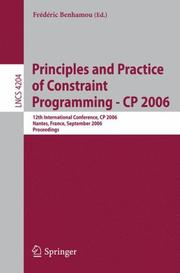
ISSN: 03029743 ISBN: 9783540462675 3540462678 3540462686 Year: 2006 Volume: 4204 Publisher: Berlin: Springer,
Abstract | Keywords | Export | Availability | Bookmark
 Loading...
Loading...Choose an application
- Reference Manager
- EndNote
- RefWorks (Direct export to RefWorks)
Constraint programming (Computer science) --- Programmation par contraintes --- Congresses. --- Congrès --- Computer Science --- Engineering & Applied Sciences --- Information Technology --- Computer Science (Hardware & Networks) --- Computer science. --- Software engineering. --- Computer programming. --- Programming languages (Electronic computers). --- Computer logic. --- Mathematical logic. --- Artificial intelligence. --- Computer Science. --- Software Engineering/Programming and Operating Systems. --- Programming Techniques. --- Programming Languages, Compilers, Interpreters. --- Artificial Intelligence (incl. Robotics). --- Logics and Meanings of Programs. --- Mathematical Logic and Formal Languages. --- AI (Artificial intelligence) --- Artificial thinking --- Electronic brains --- Intellectronics --- Intelligence, Artificial --- Intelligent machines --- Machine intelligence --- Thinking, Artificial --- Bionics --- Cognitive science --- Digital computer simulation --- Electronic data processing --- Logic machines --- Machine theory --- Self-organizing systems --- Simulation methods --- Fifth generation computers --- Neural computers --- Algebra of logic --- Logic, Universal --- Mathematical logic --- Symbolic and mathematical logic --- Symbolic logic --- Mathematics --- Algebra, Abstract --- Metamathematics --- Set theory --- Syllogism --- Computer science logic --- Logic, Symbolic and mathematical --- Computer languages --- Computer program languages --- Computer programming languages --- Machine language --- Languages, Artificial --- Computers --- Electronic computer programming --- Electronic digital computers --- Programming (Electronic computers) --- Coding theory --- Computer software engineering --- Engineering --- Informatics --- Science --- Programming --- Logic design. --- Artificial Intelligence. --- Design, Logic --- Design of logic systems --- Digital electronics --- Electronic circuit design --- Logic circuits --- Switching theory --- Constraint programming (Computer science) - Congresses.
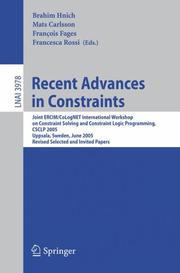
ISBN: 9783540342151 354034215X 3540342168 Year: 2006 Publisher: Berlin : Springer,
Abstract | Keywords | Export | Availability | Bookmark
 Loading...
Loading...Choose an application
- Reference Manager
- EndNote
- RefWorks (Direct export to RefWorks)
Constraint programming (Computer science) --- Logic programming --- Programmation par contraintes --- Programmation logique --- Congresses. --- Congrès --- Computer Science --- Mechanical Engineering - General --- Mechanical Engineering --- Engineering & Applied Sciences --- Information Technology --- Artificial Intelligence --- Computer science. --- Software engineering. --- Programming languages (Electronic computers). --- Algorithms. --- Computer logic. --- Artificial intelligence. --- Computer industry. --- Computer Science. --- The Computer Industry. --- Artificial Intelligence (incl. Robotics). --- Software Engineering/Programming and Operating Systems. --- Programming Languages, Compilers, Interpreters. --- Logics and Meanings of Programs. --- Algorithm Analysis and Problem Complexity. --- Electronic industries --- AI (Artificial intelligence) --- Artificial thinking --- Electronic brains --- Intellectronics --- Intelligence, Artificial --- Intelligent machines --- Machine intelligence --- Thinking, Artificial --- Bionics --- Cognitive science --- Digital computer simulation --- Electronic data processing --- Logic machines --- Machine theory --- Self-organizing systems --- Simulation methods --- Fifth generation computers --- Neural computers --- Computer science logic --- Logic, Symbolic and mathematical --- Algorism --- Algebra --- Arithmetic --- Computer languages --- Computer program languages --- Computer programming languages --- Machine language --- Languages, Artificial --- Computer software engineering --- Engineering --- Informatics --- Science --- Foundations --- Logic design. --- Computer software. --- Artificial Intelligence. --- Software, Computer --- Computer systems --- Design, Logic --- Design of logic systems --- Digital electronics --- Electronic circuit design --- Logic circuits --- Switching theory
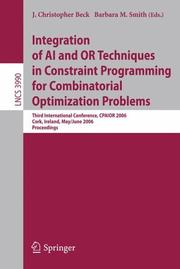
ISBN: 9783540343066 3540343067 3540343075 Year: 2006 Publisher: Berlin : Springer,
Abstract | Keywords | Export | Availability | Bookmark
 Loading...
Loading...Choose an application
- Reference Manager
- EndNote
- RefWorks (Direct export to RefWorks)
Constraints (Artificial intelligence) --- Constraint programming (Computer science) --- Combinatorial optimization --- Artificial intelligence --- Operations research --- Contraintes (Intelligence artificielle) --- Programmation par contraintes --- Optimisation combinatoire --- Intelligence artificielle --- Recherche opérationnelle --- Congresses. --- Congrès --- Applied Mathematics --- Computer Science --- Engineering & Applied Sciences --- Constraint satisfaction (Artificial intelligence) --- Computer science. --- Software engineering. --- Algorithms. --- Numerical analysis. --- Computer science --- Artificial intelligence. --- Computer Science. --- Software Engineering/Programming and Operating Systems. --- Numeric Computing. --- Discrete Mathematics in Computer Science. --- Algorithm Analysis and Problem Complexity. --- Artificial Intelligence (incl. Robotics). --- Operations Research/Decision Theory. --- Mathematics. --- AI (Artificial intelligence) --- Artificial thinking --- Electronic brains --- Intellectronics --- Intelligence, Artificial --- Intelligent machines --- Machine intelligence --- Thinking, Artificial --- Bionics --- Cognitive science --- Digital computer simulation --- Electronic data processing --- Logic machines --- Machine theory --- Self-organizing systems --- Simulation methods --- Fifth generation computers --- Neural computers --- Computer mathematics --- Discrete mathematics --- Mathematical analysis --- Algorism --- Algebra --- Arithmetic --- Computer software engineering --- Engineering --- Informatics --- Science --- Mathematics --- Foundations --- Electronic data processing. --- Computational complexity. --- Computer software. --- Operations research. --- Artificial Intelligence. --- Operational analysis --- Operational research --- Industrial engineering --- Management science --- Research --- System theory --- Software, Computer --- Computer systems --- Complexity, Computational --- ADP (Data processing) --- Automatic data processing --- Data processing --- EDP (Data processing) --- IDP (Data processing) --- Integrated data processing --- Computers --- Office practice --- Automation --- Computer science—Mathematics. --- Decision making. --- Deciding --- Decision (Psychology) --- Decision analysis --- Decision processes --- Making decisions --- Management --- Management decisions --- Choice (Psychology) --- Problem solving --- Decision making --- Discrete mathematics. --- Software Engineering. --- Numerical Analysis. --- Operations Research and Decision Theory. --- Discrete mathematical structures --- Mathematical structures, Discrete --- Structures, Discrete mathematical --- Numerical analysis
Book

ISBN: 9783540738169 3540738169 3540738177 Year: 2007 Publisher: Berlin, Heidelberg : Springer Berlin Heidelberg : Imprint: Springer,
Abstract | Keywords | Export | Availability | Bookmark
 Loading...
Loading...Choose an application
- Reference Manager
- EndNote
- RefWorks (Direct export to RefWorks)
Constraint programming (Computer science) --- Logic programming --- Programmation par contraintes --- Programmation logique --- Congresses. --- Congrès --- Computer Science --- Mechanical Engineering - General --- Engineering & Applied Sciences --- Mechanical Engineering --- Information Technology --- Artificial Intelligence --- Computer science. --- Programming languages (Electronic computers). --- Algorithms. --- Computer logic. --- Mathematical logic. --- Numerical analysis. --- Artificial intelligence. --- Computer Science. --- Artificial Intelligence (incl. Robotics). --- Programming Languages, Compilers, Interpreters. --- Logics and Meanings of Programs. --- Algorithm Analysis and Problem Complexity. --- Numeric Computing. --- Mathematical Logic and Formal Languages. --- AI (Artificial intelligence) --- Artificial thinking --- Electronic brains --- Intellectronics --- Intelligence, Artificial --- Intelligent machines --- Machine intelligence --- Thinking, Artificial --- Bionics --- Cognitive science --- Digital computer simulation --- Electronic data processing --- Logic machines --- Machine theory --- Self-organizing systems --- Simulation methods --- Fifth generation computers --- Neural computers --- Mathematical analysis --- Algebra of logic --- Logic, Universal --- Mathematical logic --- Symbolic and mathematical logic --- Symbolic logic --- Mathematics --- Algebra, Abstract --- Metamathematics --- Set theory --- Syllogism --- Computer science logic --- Logic, Symbolic and mathematical --- Algorism --- Algebra --- Arithmetic --- Computer languages --- Computer program languages --- Computer programming languages --- Machine language --- Languages, Artificial --- Informatics --- Science --- Foundations --- Logic design. --- Computer software. --- Electronic data processing. --- Artificial Intelligence. --- ADP (Data processing) --- Automatic data processing --- Data processing --- EDP (Data processing) --- IDP (Data processing) --- Integrated data processing --- Computers --- Office practice --- Software, Computer --- Computer systems --- Design, Logic --- Design of logic systems --- Digital electronics --- Electronic circuit design --- Logic circuits --- Switching theory --- Automation --- Programming languages (Electronic computers) --- Logic, Symbolic and mathematical.
Book
ISBN: 9783540749691 3540749691 3540749705 Year: 2007 Publisher: Berlin ; New York : Springer,
Abstract | Keywords | Export | Availability | Bookmark
 Loading...
Loading...Choose an application
- Reference Manager
- EndNote
- RefWorks (Direct export to RefWorks)
The 13th International Conference on Principles and Practice of Constraint Programming (CP 2007) was held in Providence, RI, USA, September 23–27, 2007, in conjunction with the International Conference on Automated Planning and Scheduling (ICAPS). Held annually, the CP conference series is the premier international conference on constraint programming. The conference focuses on all aspects of computing with constraints. The CP conference - ries is organized by the Association for Constraint Programming (ACP). - formation about the conferences in the series can be found on the Web at http://www. cs. ualberta. ca/~ai/cp/. Information about ACP can be found athttp://www. a4cp. org/. CP 2007 launched two calls for contributions: a call for research papers, describing novel contributions in the ?eld, and a call for application papers, describing applications of constraint technology in the industrial world. The research track received 143 submissions and the application track received 22 submissions. Research papers were reviewed under a double-blind scheme. They received three reviews that the authors had the opportunity to see and to react tobeforethepapersandtheirreviewswerediscussedextensivelybythemembers of the Program Committee. Application papers were reviewed by a separate- plication Committee. The Program Committee and the Application Committee then selected 43 research papers and 9 application papers to be published in full in the proceedings,andanadditional14researchpapersto be published as short papers. The full papers were presented at the conference in two parallel tracks and the short papers were presented in a poster session.
Constraint programming (Computer science) --- Programmation par contraintes --- Congresses. --- Congrès --- Computer Science --- Engineering & Applied Sciences --- Information Technology --- Computer Science (Hardware & Networks) --- Computer science. --- Software engineering. --- Computer programming. --- Programming languages (Electronic computers). --- Computer logic. --- Mathematical logic. --- Artificial intelligence. --- Computer Science. --- Software Engineering/Programming and Operating Systems. --- Programming Techniques. --- Programming Languages, Compilers, Interpreters. --- Artificial Intelligence (incl. Robotics). --- Logics and Meanings of Programs. --- Mathematical Logic and Formal Languages. --- AI (Artificial intelligence) --- Artificial thinking --- Electronic brains --- Intellectronics --- Intelligence, Artificial --- Intelligent machines --- Machine intelligence --- Thinking, Artificial --- Bionics --- Cognitive science --- Digital computer simulation --- Electronic data processing --- Logic machines --- Machine theory --- Self-organizing systems --- Simulation methods --- Fifth generation computers --- Neural computers --- Algebra of logic --- Logic, Universal --- Mathematical logic --- Symbolic and mathematical logic --- Symbolic logic --- Mathematics --- Algebra, Abstract --- Metamathematics --- Set theory --- Syllogism --- Computer science logic --- Logic, Symbolic and mathematical --- Computer languages --- Computer program languages --- Computer programming languages --- Machine language --- Languages, Artificial --- Computers --- Electronic computer programming --- Electronic digital computers --- Programming (Electronic computers) --- Coding theory --- Computer software engineering --- Engineering --- Informatics --- Science --- Programming --- Logic design. --- Artificial Intelligence. --- Design, Logic --- Design of logic systems --- Digital electronics --- Electronic circuit design --- Logic circuits --- Switching theory
Book
ISBN: 9783540681540 354068154X 3540681558 Year: 2008 Publisher: Berlin ; New York : Springer,
Abstract | Keywords | Export | Availability | Bookmark
 Loading...
Loading...Choose an application
- Reference Manager
- EndNote
- RefWorks (Direct export to RefWorks)
The 5th International Conference on Integration of AI and OR Techniques in Constraint Programming for Combinatorial Optimization Problems (CPAIOR 2008) was held in Paris, France May 20–23, 2008. The purpose of this conference series is to bring together researchers in the ?elds of constraint programming, arti?cial intelligence, and operations research to explore ways of solving large-scale, practical optimization problems through integration and hybridization of the ?elds’ di?erent techniques. Through the years, this research community is discovering that the ?elds have much in c- mon, and there has been tremendous richness in the resulting cross-fertilization of ?elds. This year, we allowed submissions of both long (15 page) and short (5 page) papers, with short papers either being original work, a reduced version of a long paper, or an extended abstract of work published elsewhere. We were not s- prised by the 69 submissions in the long paper category: this is an active ?eld with many researchers. We were surprised by the 61 short paper submissions. This was far more than predicted. With 130 high-quality submissions, compe- tion for acceptance in this year’s program was particularly ?erce. In the end, we accepted 18 long papers and 22 short papers for presentation and publication in this volume.
Constraints (Artificial intelligence) --- Constraint programming (Computer science) --- Combinatorial optimization --- Operations research --- Artificial intelligence --- Contraintes (Intelligence artificielle) --- Programmation par contraintes --- Optimisation combinatoire --- Recherche opérationnelle --- Intelligence artificielle --- Congresses. --- Data processing --- Technique --- Congrès --- Informatique --- Applied Mathematics --- Computer Science --- Engineering & Applied Sciences --- Constraint satisfaction (Artificial intelligence) --- AI (Artificial intelligence) --- Artificial thinking --- Electronic brains --- Intellectronics --- Intelligence, Artificial --- Intelligent machines --- Machine intelligence --- Thinking, Artificial --- Operational analysis --- Operational research --- Optimization, Combinatorial --- Computer science. --- Operations research. --- Decision making. --- Computers. --- Algorithms. --- Numerical analysis. --- Computer science --- Artificial intelligence. --- Computer Science. --- Theory of Computation. --- Numeric Computing. --- Discrete Mathematics in Computer Science. --- Algorithm Analysis and Problem Complexity. --- Artificial Intelligence (incl. Robotics). --- Operation Research/Decision Theory. --- Mathematics. --- Bionics --- Cognitive science --- Digital computer simulation --- Electronic data processing --- Logic machines --- Machine theory --- Self-organizing systems --- Simulation methods --- Fifth generation computers --- Neural computers --- Computer mathematics --- Discrete mathematics --- Mathematical analysis --- Algorism --- Algebra --- Arithmetic --- Automatic computers --- Automatic data processors --- Computer hardware --- Computing machines (Computers) --- Electronic calculating-machines --- Electronic computers --- Hardware, Computer --- Computer systems --- Cybernetics --- Calculators --- Cyberspace --- Deciding --- Decision (Psychology) --- Decision analysis --- Decision processes --- Making decisions --- Management --- Management decisions --- Choice (Psychology) --- Problem solving --- Industrial engineering --- Management science --- Research --- System theory --- Informatics --- Science --- Mathematics --- Foundations --- Decision making --- Combinatorial analysis --- Mathematical optimization --- Information theory. --- Electronic data processing. --- Computational complexity. --- Computer software. --- Artificial Intelligence. --- Operations Research/Decision Theory. --- Software, Computer --- Complexity, Computational --- ADP (Data processing) --- Automatic data processing --- EDP (Data processing) --- IDP (Data processing) --- Integrated data processing --- Computers --- Office practice --- Communication theory --- Communication --- Automation --- Computer science—Mathematics. --- Discrete mathematics. --- Numerical Analysis. --- Operations Research and Decision Theory. --- Discrete mathematical structures --- Mathematical structures, Discrete --- Structures, Discrete mathematical --- Numerical analysis
| Listing 1 - 10 of 12 | << page >> |
Sort by
|

 Search
Search Feedback
Feedback About UniCat
About UniCat  Help
Help News
News